The Meaning of a Red Door
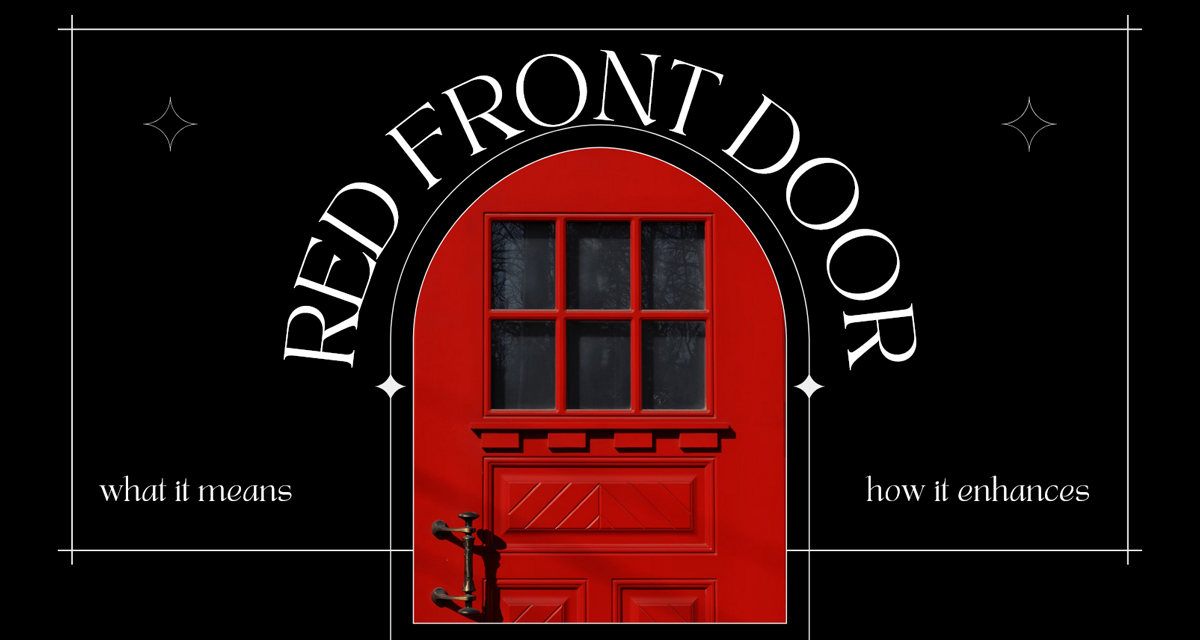
The Meaning of a Red Door
If you’ve been considering making changes to boost the curb appeal and look of your home, you’ve likely read that one of the easiest ways to do so is by swapping out your front door color. However, that in itself leaves you with a decision – should you go with a complementary color that matches your existing exterior, a bold statement that makes your home stand out, or simply your favorite hue? For many people, red meets all of those requirements; it’s bold, complements a variety of common home exterior neutrals, and is commonly top of the list on favorite color lists.
Other than being stylish, vivid, and classic, though, maybe it’s time to explore the other interesting impacts a red door can bring to your exterior – and your life. In fact, red doors have long held cultural significance in many cultures around the world. Let’s take a look at some of the many reasons you might have to consider choosing red.
Cultural Significance of a Red Door
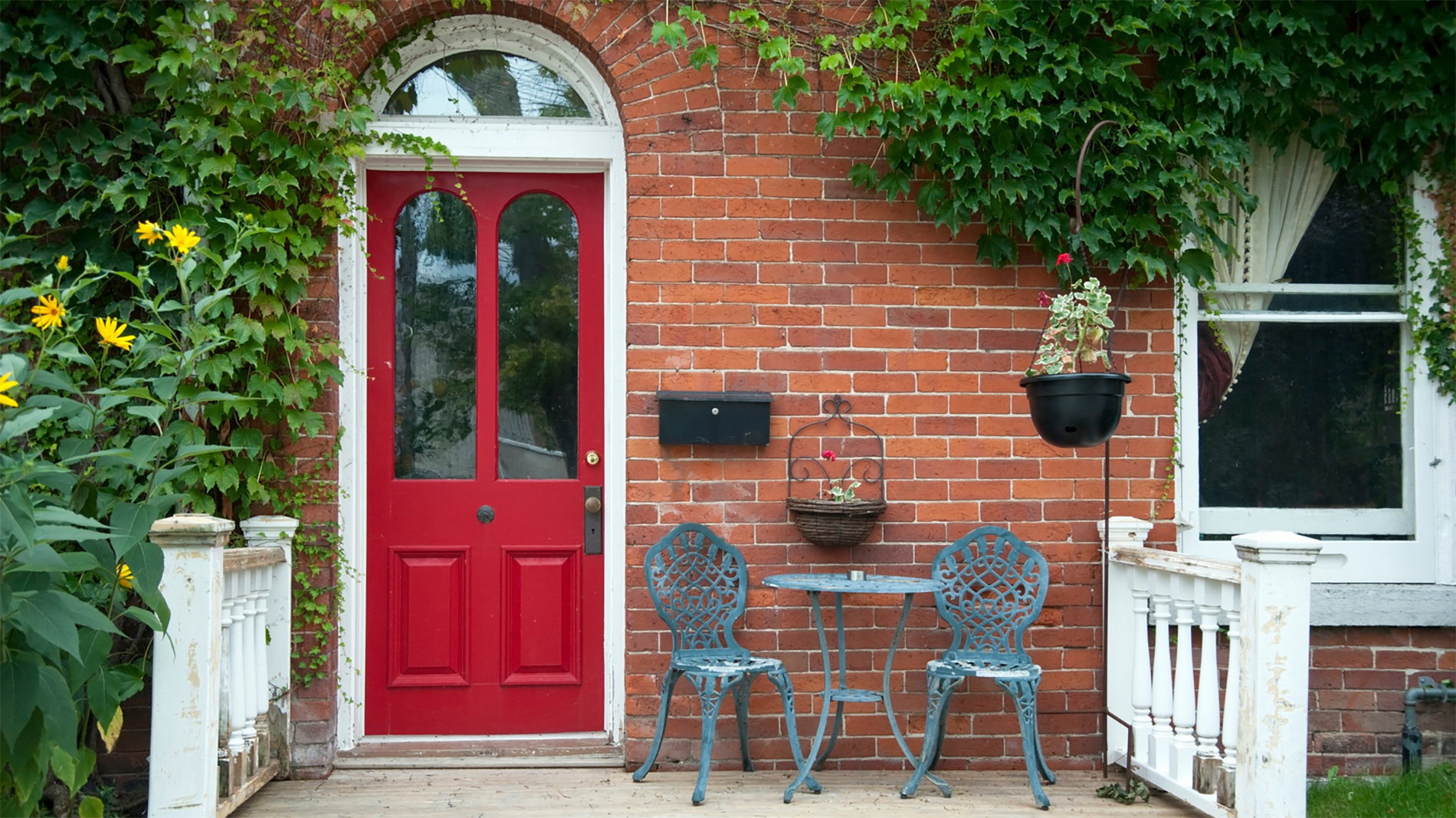
The unique meaning of the color red – and that of painting a door red – can be observed in many different cultures, countries, and spiritual traditions. Each of them has its own unique interpretations and symbolism attached to the color.
China
In China, red is the color of luck. It is also frequently used by high-ranking government officials because it is associated with prosperity. During the Lunar New Year, families decorate windows with red paper cuttings and couplets expressing well-wishes, and you can see red celebrated everywhere during the festive season.
The Chinese traditionally painted doors red to ward off evil spirits and negative influences.
Japan
In Japanese culture, red is often associated with vitality and sacredness. For that reason, temples and shrines often feature red doors to signify entry to holy places. Like the Chinese, some Japanese also see red doors as a symbol of protection against evil spirits and bad luck.
United States
In the US, red front doors are often perceived as welcoming. This may be the lasting effects of a Civil War-era phenomenon. A red door signified rest, safety, and food to travelers, especially runaway slaves on the Underground Railroad.
Scotland
Red front doors hold a much more practical purpose in Scotland. There, the color indicates that the home mortgage has been paid in full. For that reason, red shows others that an accomplishment was achieved.
Ireland
The people of Ireland once painted doors red to ward off ghosts and evil spirits. It is also seen as a sign of rebellion in the country. In Victorian times, Irish people were ordered to paint their front doors black in honor of England’s Queen Victoria; instead, they painted them bright colors like red to signify their defiance.
Biblical Significance
In the Old Testament’s book of Exodus, the Jewish Israelites were instructed to mark their doors with the blood of a lamb to serve as a sign of protection from the final plague. Soon after, the angel of death passed over the homes marked with blood. This began the tradition of Passover.
Many denominations of the Christian faith traditionally used red to symbolize the blood of Christ, as well. In some Catholic churches, a red door means you have entered a holy place.
The Meaning of a Red Door in Feng Shui
Feng shui literally translates to “wind” and “water.” It is a Chinese philosophy in which the arrangement and color choice of objects in a room relate to the flow of energy, known as Chi. In this philosophy, the front door is considered the mouth of the home, called the “Mouth of Chi.”
Red is one of the most popular color choices for a feng shui-inspired home – including the front door . Red represents good luck, prosperity, and protection. It is also associated with fire energy, which is about manifesting life, having courage, passion, and keeping active.
“Is a Red Door Good Feng Shui?” About Feng Shui
Since a front door is considered the mouth of Chi, making sure your front door is welcoming and balanced can ensure positive energy flow, abundance, and well-being. In addition, enhancing its beauty can benefit the energy of everyone in your household. For that reason, red, which represents protection, luck, and prosperity, is considered by many who study feng shui to be an excellent color for a front door.
Front Door Feng Shui Tips
- Keep a clear, well-lit pathway. Trim overgrown plants and move garbage bins and other clutter for a smooth flow of chi into your home.
- Clear the dirt and grime off your door and fix squeaky hinges, peeling paint, or other broken parts. A clean door attracts positive energy.
- Add a wreath, plaque, or other decorations as welcoming symbols.
- Make sure your door opens inward. This symbolizes the inviting of energy into your home.
- Add balance and symmetry by flanking the door with plants or other decorative elements.
- Harmonize your front door with nature by adding landscape decor, adding water features, and incorporating other natural elements.
So, Should You Paint Your Door Red? Feng Shui and Directionality
If you want to encourage the flow of Chi and improve your home’s feng shui, you’ll also want to take into consideration the direction your home faces. Every direction coincides with certain elements, and some colors are better than others, depending on your home’s directionality.
South
A south-facing door has the element of fire. The best colors correspond to this scorching element. Think red, orange, pink, and purple.
Northeast and Southwest
Northeast-facing and southwest-facing homes both incorporate the earth element, which fosters the virtues of growth and creativity. The best colors for earth are yellow, beige, brown, and terracotta. However, red and orange are supporting colors as the element of fire supports earth.
East and Southeast
East- and southeast-facing doors both host the wood element. While the best colors for this are green and brown, they can be supported with red because of the supportive relationship between wood and fire. The presence of wood supports and enhances fire energy.
When to Avoid Using Red
If you have a west or northwest-facing door, you should avoid using red. These directions are associated with the metal element. The conflict between fire and metal energy can create disharmony and weaken the positive energy flow.
What the Color Red Represents in Design
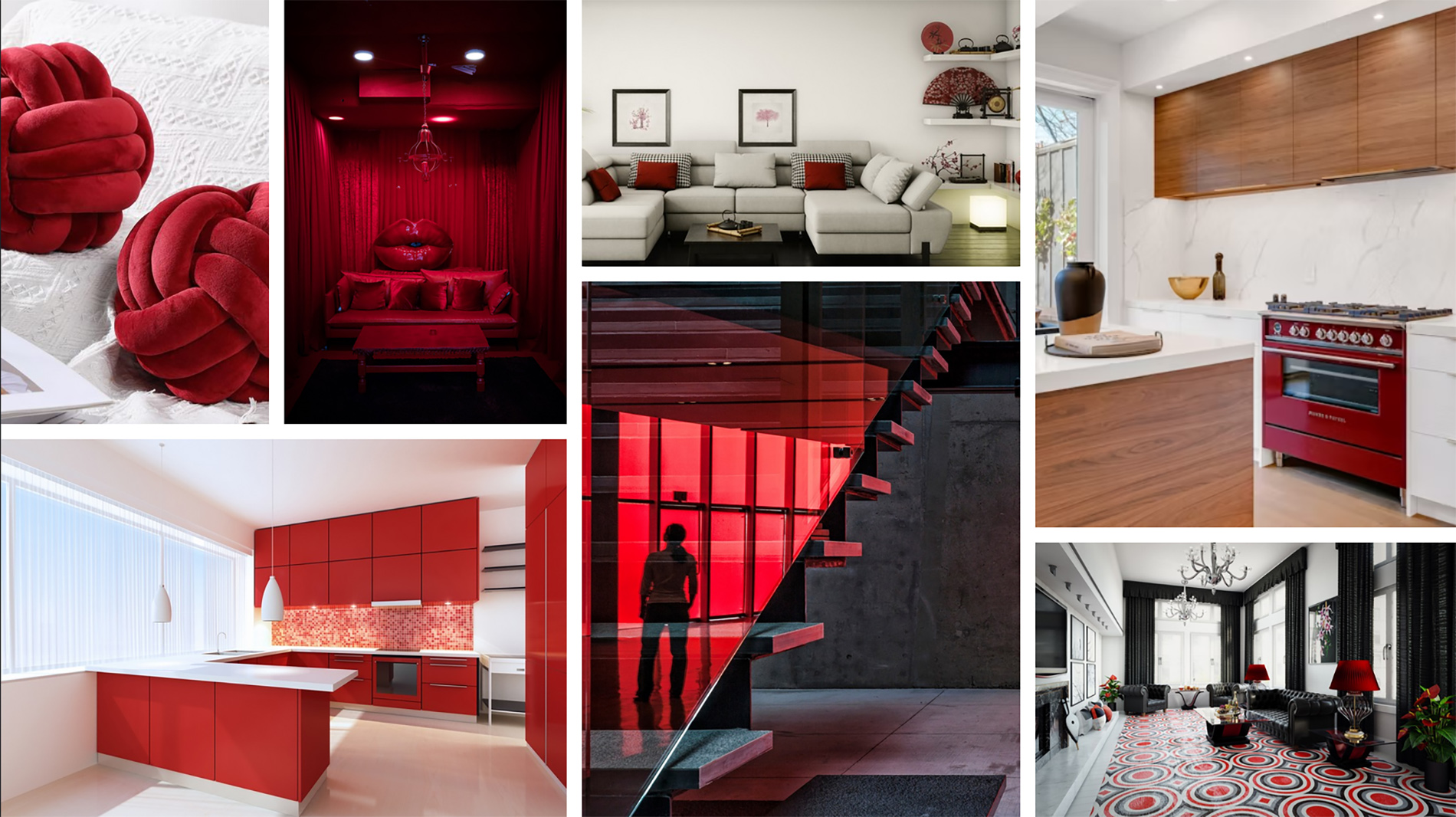
Aside from its cultural and spiritual significance, red has also made a serious impact on interior and exterior home design. It may even have an effect on how you feel while in the room or on the street viewing your front door.
Red is a color that demands attention; it draws a person’s eye. That’s why many people choose red for accents like pillows and rugs, statement furniture pieces, and bold accessories to create a striking yet warm and inviting look. The same can be said for a red front door.
In fact, those who have studied color theory and color psychology have identified the mental and physical effects red can create within people.
The color has been put to use by businesses and individuals to evoke certain emotions and responses.
- Restaurants – Red has been shown to increase hunger and appetite. This is why many fast food restaurants use it in their marketing, especially bright red. Deeper reds bring up feelings of appetite but create a more inviting atmosphere for finer dining.
- Retail – Since the color is an attention-getter, retail companies use red letters to encourage people to make purchases. Words such as “Sale” are often displayed in red capital letters.
- Child Spaces – From toy sections to play areas, red is often used in child-centered spaces because it brings high energy.
On the other hand, if businesses and other establishments want to create a calm and relaxing environment, red is far from the first color choice. This is why red is not seen in spas, office spaces, hospitals, or clinics.
Choosing the Right Red for Your Front Door
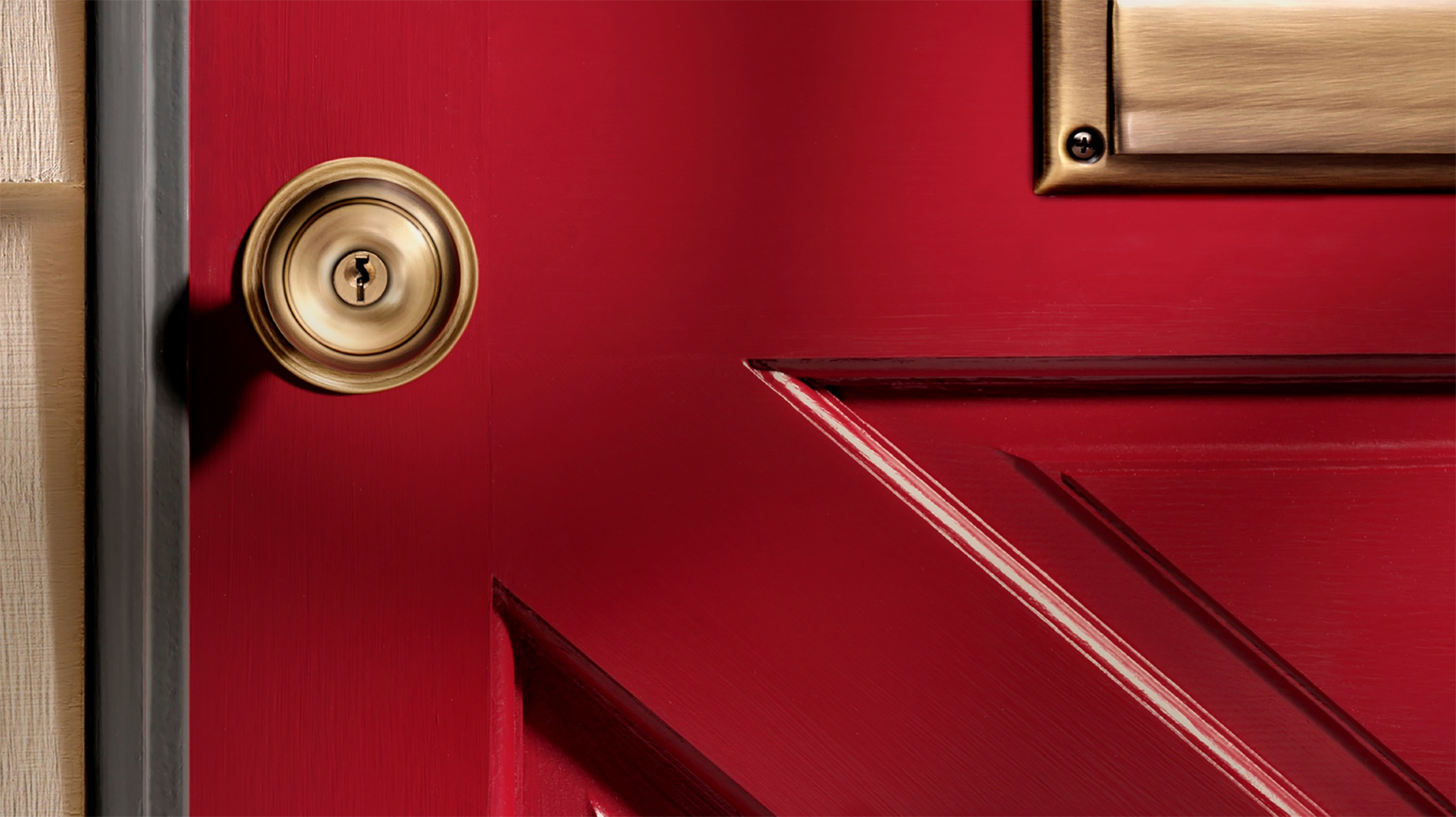
If you’ve settled on using red for your front door, your next task is to choose the right shade. Different shades of red can create different emotions and different sensations within the viewer, so we encourage you to evaluate the selections carefully. Some popular choices are:
Classic Red
A classic red is vibrant and eye-catching. It works well for a variety of architectural styles, from traditional or rustic homes to contemporary, modern homes. This timeless hue can add a sense of warmth and energy with its bold and welcoming touch.
Burgundy
To bring a touch of sophistication and elegance to your red door, choosing a deeper red like burgundy or cranberry will do nicely. Richer shades of red bring a feel of luxury, opulence, and depth. It is perfect for creating a dramatic entrance that commands your guests’ attention.
Brick Red
Brick reds bring a warm and earthy tone that complements rustic, farmhouse, and colonial-style homes with effortless charm. This hue evokes a sense of heritage and tradition and mirrors natural colors that create a cozy and inviting atmosphere. It’s also a more muted but just as rich version of red.
Cherry Red
A bright cherry red brings a touch of fun and liveliness. It will show your front door as the focal point of your home. It doesn’t matter if your home is modern or traditional – a cherry red door makes a memorable first impression.
Deep Red
Darker reds bring a feel of drama and richness, making a bold statement without the brightness. Similar to burgundy, it offers a feeling of luxury and depth. Deep reds tend to look more expensive than brighter reds, adding a touch of class.
Coral Red
Coral reds bring that fresh, contemporary look to your door. These less severe reds can bring a modern and cheerful vibe to your home. The color’s warm undertones bring feelings of vitality and warmth and is a popular choice in coastal or tropical areas.
Crimson
Crimson reds are a timeless choice. This shade compliments homes with classic architectural details, exuding a sense of tradition and grandeur. It pairs well with brick, stone, and stucco and harmonizes its natural textures to create a cohesive and polished appearance.
Rust Red
If you’re in the market for a muted, earthy tone, rust-red shades are perfect for blending in with the natural surroundings or building materials. Rust-red doors harmonize effortlessly with natural materials like wood siding, stone pathways, or gardens. You can choose a shade richer in red for a more bold statement, or with more brown to create a natural flow.
Tomato Red
Tomato reds are bright and cheerful. This shade adds a lively and energetic touch to your front door and compliments all home styles, from traditional cottages to modern townhouses. Tomato reds are an especially delicious way to pep up the standard front entrance.
Tips for Choosing the Right Shade
Even after you land on your ideal red family, you’ll still need to find the right shade for your door.
Here are a few tips as you narrow down your choices:
- Think Color Theory – What colors are in your garden, landscape, or neighborhood? These can impact how the red will look.
- Consider Your Tastes – Do you prefer bright colors or muted natural tones? Do you like bold statements or a cohesive look that flows well with the home’s surroundings?
- Take Your Home’s Exterior into Consideration – Does the red complement the color of your siding? Or, are you looking for a shade that will stand out starkly against the background your home already provides?
- Try These Combinations – Whether you’re repainting your home’s exterior or trying to complement its existing finishes, consider these combos.
- If you have a white or off-white exterior, a bright, bold red color will create a classic combination that exudes elegance and timeliness.
- Gray exteriors can be paired with a deep red to offer a sophisticated and modern look. Light grays will give a soft contrast, and darker grays will create a bold and dramatic look.
- Beige or taupe exteriors with a deep red will offer a warm and welcoming appearance. The neutral backdrop will highlight the boldness of the red door.
- Pair your black exterior with a crimson-red door. This will create a bold and dramatic look while also being modern and striking.
- If you have a yellow or gold exterior, a tomato-red door will create a cheerful and bright appearance. This combination is warm, inviting, and full of energy.
Once you have a few finalists, paint a small section of your door or use a test board to see how the different shades look. Then, pick the one that speaks to you the most!
Other Front Door Colors and What They Mean
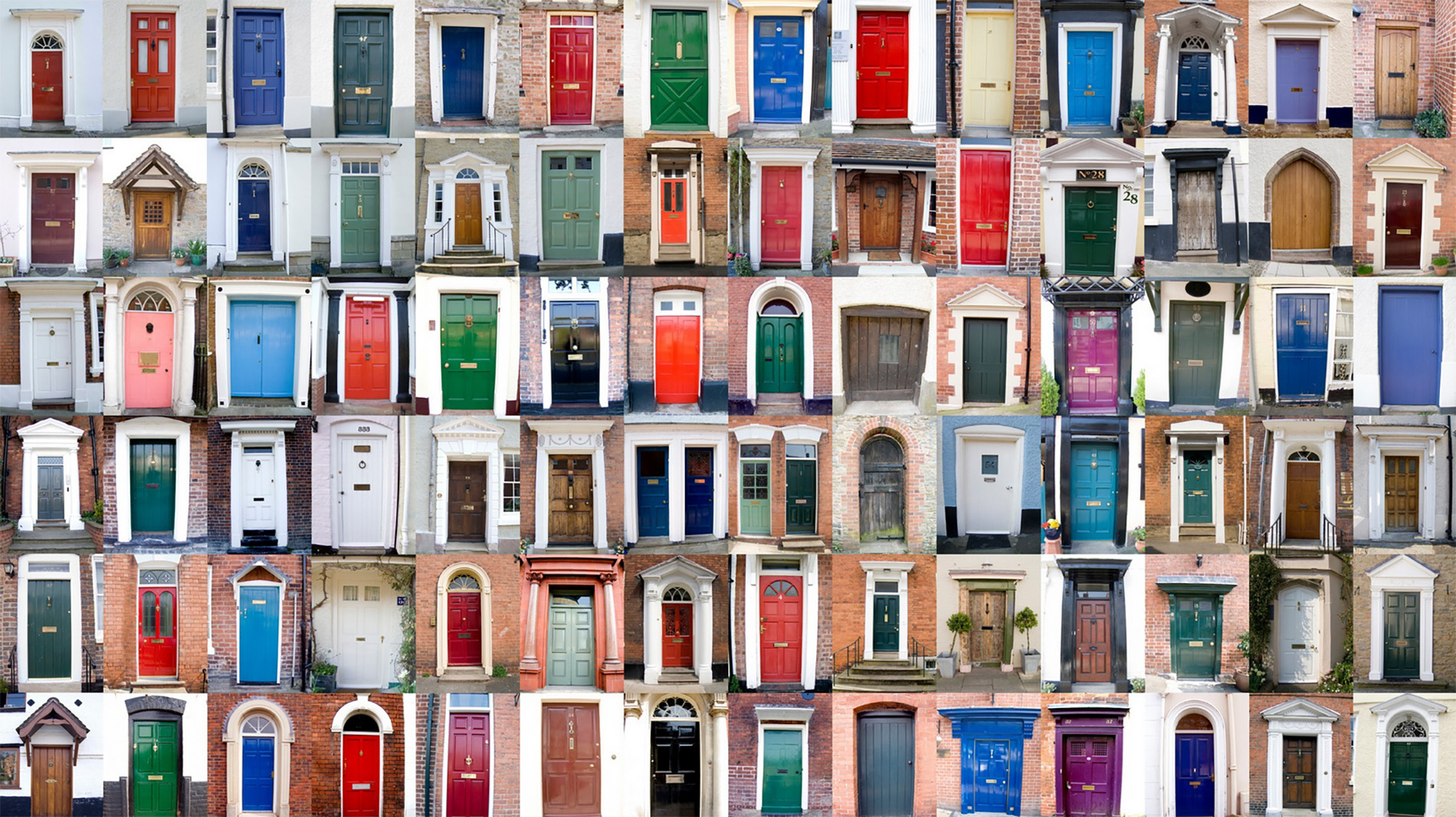
Not a fan of red? That’s no big deal; there are plenty of other color options that bring meaning and symbolism to your home.
- Orange – Orange is a warm and inviting color that shows the people in this home have energy, enthusiasm, and a zest for life. It is also linked to creativity and artistic expression.
- Yellow – Yellow doors can symbolize a cheerful home environment, evoking feelings of warmth and welcome. They may also show that the residents are imaginative.
- Green – This color evokes thoughts of nature and the outdoors. A green door can symbolize a connection to the natural world, and indicate that the people who live there are peaceful and soothing.
- Blue – Blue is an approachable, calm, and tranquil color. It brings feelings of relaxation and comfort and shows that your home is a place where people can unwind and de-stress.
- Purple – Purple has been known to represent luxury, riches, power, and wisdom. Having a purple front door also holds a deeper meaning for many people around the world.
- Black – Black is a strong, authoritative color. It is associated with elegance and sophistication and can show people you have a refined and stylish home.
- Gray – Gray is a neutral color that signifies balance and neutrality. It symbolizes a harmonious and balanced home environment where people can seek peace and equilibrium.
- White – White is often associated with purity and innocence, and a white door shows that this is a clean and well-maintained home. It can also represent renewal and rejuvenation.
What Color Are You Painting Your Front Door?
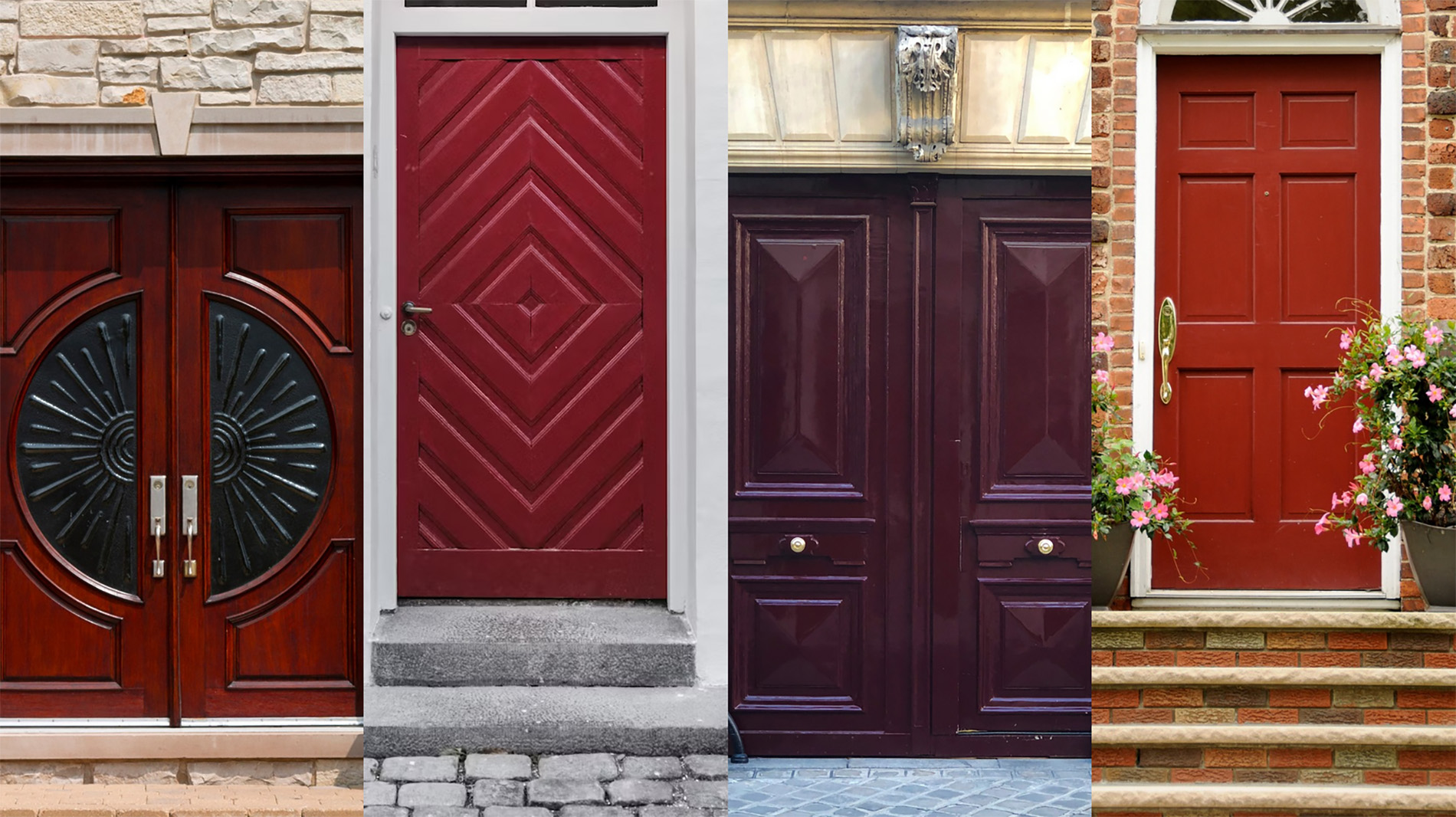
If you’re looking to spice up your front door, a shade of red can be a bold, passionate choice to elevate your curb appeal and improve your home’s feng shui. If you’re not in the mood for red, check out our front door color guide series, beginning with the color purple. Then, subscribe to our blog for more tips, tricks, and information to help you SLAY your home design, your energy, and your life!
Sources:
- Smithsonian Institution. (n.d.). Colors: Red. Smithsonian Institution. https://asia.si.edu/explore-art-culture/art-stories/colors/red/
- Moudgil, P., & Khandia, R. (2020). Biological functions of C-reactive protein in cardiovascular disease: A proteomics perspective. Journal of Proteomics & Bioinformatics, 21(5), Article PMC7658407. https://www.ncbi.nlm.nih.gov/pmc/articles/PMC7658407/



